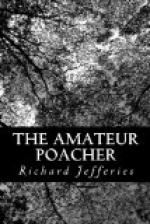If a solitary hurdle be set up in a meadow as a hiding-place from behind which to shoot the rabbits of a burrow, not one will come out within gun-shot that evening. They know-that it is something strange, the use of which they do not understand and therefore avoid. When I first began to shoot, the difficulty was to judge the distances, and to know how far a rabbit was from a favourite hiding-place. I once carefully dropped small green boughs, just broken off, at twenty, thirty, and forty yards, measuring by paces. This was in the morning.
In the evening not a rabbit would come out anywhere near these boughs; they were shy of them even when the leaves had withered and turned brown; so that I took them away. Yet of the green boughs blown off by a gale, or the dead grey branches that fall of their own weight, they take no notice.
First, then, they must have heard me in their burrows pacing by; secondly, they scented the boughs as having been handled, and connected the two circumstances together; and, thirdly, though aware that the boughs themselves were harmless, they felt that harm was intended. The pheasant had been walking about in the corner where the hedges met, but now he went in; still, as he entered the hedge in a quiet way, he did not appear to be alarmed. The sheep, tired of being constantly driven from their food, now sheered out from the hedge, and allowed me to go by.
As I passed I gathered a few haws and ate them. The reason why birds do not care much for berries before they are forced to take to them by frost is because of the stone within, so that the food afforded by the berries is really small. Yew-berries are an exception; they have a stone, but the covering to it is sweet, succulent, and thick, and dearly loved by thrushes. In the ditch the tall grasses, having escaped the scythe, bowed low with the weight of their own awn-like seeds.
The corner was not far off now; and I waited awhile behind a large hawthorn bush growing on the ‘shore’ of the ditch, thinking that I might see the pheasant on the mound, or that at least he would recover confidence if he had previously heard anything. Inside the bush was a nest already partly filled with fallen leaves, like a little basket.
A rabbit had been feeding on the other side, but now, suspicious, came over the bank, and, seeing me, suddenly stopped and lifted himself up. In that moment I could have shot him, being so near, without putting the gun to the shoulder, by the sense of direction in the hands; the next he dived into a burrow. Looking round the bush, I now saw the pheasant in the hedge, that crossed at right angles in front; this was fortunate, because through that hedge there was another meadow. It was full of nut-tree bushes, very tall and thick at the top, but lower down thin, as is usually the case when poles grow high. To fill the space a fence had been made of stakes and bushes woven between them, and on this the pheasant stood.




